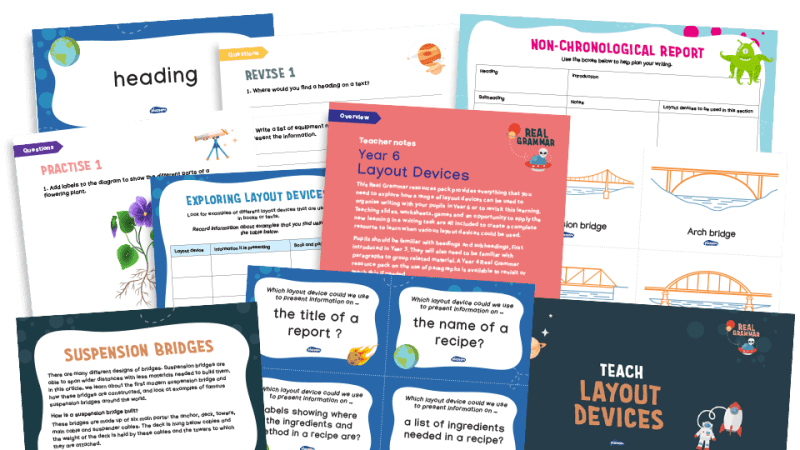The 6 essential ingredients of great English teaching in secondary school

Of course you’ll give the final recipe your own, unique twist, says Andy Tharby – but get these elements right, and both progress and satisfaction should be guaranteed…

- by Andy Tharby
- Secondary English teacher, subject leader and author Visit website

No two English teachers will ever fully agree on what makes effective English teaching. And why should we? Each new teacher joins the profession with a vision about the kind of teacher they would like to become as well as a very distinctive set of personal aims and values.
Over time, each of us develops a more and more nuanced conception of the factors that make for successful English teaching.
We usually draw this from our personal experience, the wisdom of colleagues and our understanding of what has been shown to work in other contexts.
For me, great English teaching is defined by a genuine love for the subject and an extensive knowledge of how students learn to read and write.
I am sceptical of the suggestion that a great English teacher is some kind of charismatic maverick or mystical sage. Passion is paper-thin without method.
Similarly, a teacher without a genuine enthusiasm for language and literature will struggle to soften their clinical approach.
So, in light of this, and drawing on what I have discovered from educational research, what do I believe to be the six features of great English teaching?
1 | Great English teaching requires an understanding that the subject is an interconnected body of knowledge
With the best teaching, students come to see the subject of English as its own universe rather than a series of atomised tasks and texts. Key Stage 3, therefore, should be used to induct students into this strange and beautiful world, laying the all-important foundations for Key Stage 4 as we do so.
This requires a coherent, sequential and systematic approach to the English curriculum. From Year 7, students must be explicitly taught about literary genre, form, structure and devices.
They should gain a strong understanding of these and should experiment with them in their own writing. Ideally, each new text should introduce a convention or concept that can be taken forward and used to enhance the next text that the child reads, and the next after that…
2 | Great English teaching is always supported by ambitious text choices
All children are entitled to read literature that challenges them to imagine a world beyond the limiting confines of their own.
A text should provoke a student to consider times, places, people and ideas that they would not encounter in everyday life.
We should be brave. Many children’s only experience of literary texts will be in school. We should not cave into the fear that we will bore them or put them off for life.
Reading Lord of the Flies – or similar – in its entirety at the start of Year 7 is a daring and exciting move. Go for it!
I find the following questions to be useful when choosing texts:
- Does the text provide enough (or too much) lexical challenge for the age group?
- Does the text allow for conceptual and philosophical thought about the human condition?
- Does the text introduce literary conventions that induct the students into the discipline of literary study?
- Does the text provide students with cultural capital and/or useful knowledge?
3 | Great English teaching places great literature at the heart of every lesson
We should adopt a simple philosophy. The pedagogical methods we use, the activities we plan, the lives and interests of our students, the weather and the time of day should play subservient roles.
The throbbing heart of the English lesson should be the text itself.
Often the best way to engage a student is to ensure that she understands what she is reading.
At first, at the factual, obvious level – the who, what, where, why and when.
Engagement and interest are often a result of this slowly deepening understanding. A ripple that, eventually, becomes a wave.
4 | Great English teaching hinges on subtle and sensitive modelling
This stage is so important but so often overlooked. Many young people arrive at secondary school with little knowledge of the features and structures of the genres they will be expected to write in.
This is especially true in the cases of analytical writing and rhetorical writing. Unless the implicit underlying procedural thinking that goes into writing in these genres is made explicit, then students will fail to grasp them securely.
The two modelling strategies I find most useful are ‘live writing’ and ‘worked examples’.
Live writing involves writing on the board, from scratch, with the help of the whole-class, discussing and editing as we go.
Worked examples are completed pieces of writing that students use as a guide when they are writing on a different topic in the same genre.
Students can then emulate the genre features with their own ideas.
5 | Great English teaching places a great value on words
A single word is a complete concept that forms a gateway to our storehouse of knowledge on a topic. A wide vocabulary not only helps students to comprehend a text, but it also helps them to make precise and perceptive interpretations and inferences.
Bringing Words to Life by Isabel Beck, Margaret McKeown and Linda Kucan offers the best evidence-informed advice on vocabulary teaching I know: teach a new word in context; explain how the word operates in other contexts; give students lots of opportunity to practise; and provide multiple exposures to the word.
Ideally, your English department will design a five-year sequential approach to vocabulary that begins in Year 7, finishes in Year 11 and includes a mixture of words commonly found in academic books and broadsheet newspapers – such as coincidence, absurd and industrious – and subject-specific words – such as protagonist, anaphora and omniscient narrator.
6 | Great English teaching gives students lots and lots of writing practice
It comes as no surprise that there is a strong and well-established correlation between the quantity of writing in English GCSE exams and level of attainment.
Over five years, students need to develop their stamina and their skill. They can only do this when teachers dedicate lots of lesson time to writing practice.
It is very important that this writing is carefully scaffolded and that time is given to practising the component parts of writing – sentences, grammatical structures and paragraphs – as well as full texts.
This should also be supported by precise formative assessment. Inexperienced writers often require minutely focused feedback.
Great English teaching, therefore, is not about spectacular lessons – although it might include them of course! This is because student learning is slow, erratic, associative and cumulative.
It does not readily conform to hour-long, bite-size chunks.
Great English teaching starts as soon as the students arrive in Year 7 and is supported by a carefully designed curriculum and collaboration between teachers.
In other words, a heady concoction of love and method.
Andy Tharby is an English teacher and research lead at Durrington High School. He is the author of Making Every English Lesson Count and co-author of Making Every Lesson Count. Download our AQA English Language Paper 1 ultimate revision booklet.







